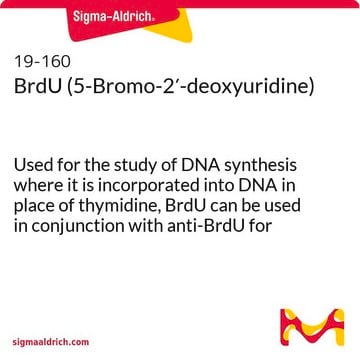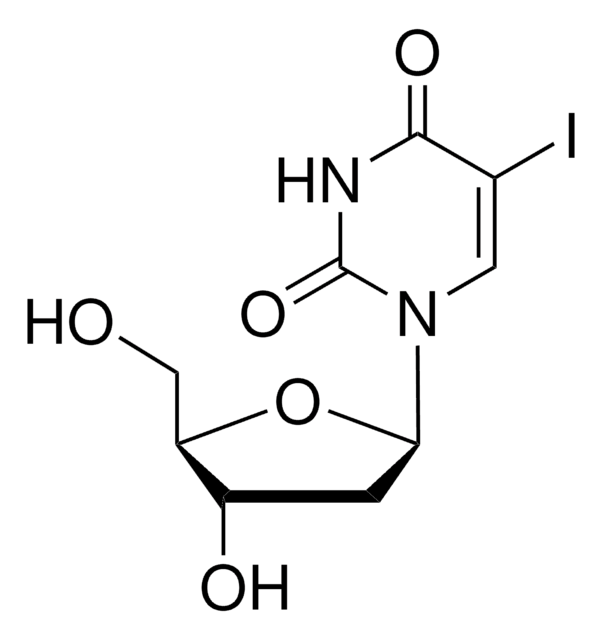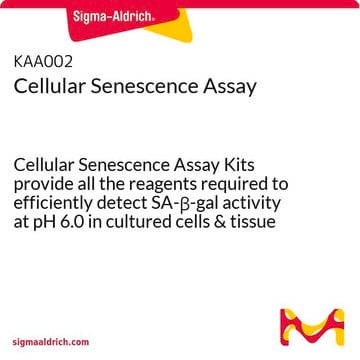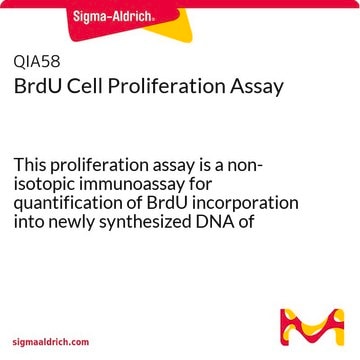10280879001
Roche
5-bromo-2′-désoxyuridine
>97%, crystalline solid, pkg of 1 g
Synonyme(s) :
5-BrdU, 5-bromo-1-(2-désoxy-β-D-ribofuranosyl)uracile, 5-bromo-uracile-désoxyriboside, BUdR
About This Item
Produits recommandés
Niveau de qualité
Pureté
>97%
Forme
crystalline solid
Poids mol.
307.1
Conditionnement
pkg of 1 g
Fabricant/nom de marque
Roche
Pf
191-194 °C (dec.) (lit.)
Conditions d'expédition
wet ice
Température de stockage
2-8°C
Chaîne SMILES
OC[C@H]1O[C@H](C[C@@H]1O)N2C=C(Br)C(=O)NC2=O
InChI
1S/C9H11BrN2O5/c10-4-2-12(9(16)11-8(4)15)7-1-5(14)6(3-13)17-7/h2,5-7,13-14H,1,3H2,(H,11,15,16)/t5-,6+,7+/m0/s1
Clé InChI
WOVKYSAHUYNSMH-RRKCRQDMSA-N
Vous recherchez des produits similaires ? Visite Guide de comparaison des produits
Description générale
Application
Actions biochimiques/physiologiques
Qualité
Notes préparatoires
According to literature, 5 to 50 mg/kg body weight mice have been used for the detection of cell proliferation.
Preparation of Working Solution
Corresponding to the BrdU-labeling reagent which is included in the Roche Cell Proliferation ELISA, BrdU kits and in the Roche 5-Bromo-2′-deoxy-uridine Labeling and Detection Kits, prepare the BrdU working solution by dissolving the substance in PBS to a 10 mM stock solution (MW of BrdU = 307.1 D). For the in vivo use of BrdU dissolve in PBS; for the in vitro use of BrdU, dissolve in double-distilled water at the same 10 mM concentration.
Storage conditions (working solution): -15 to -25 °C
Autres remarques
Mention d'avertissement
Danger
Mentions de danger
Conseils de prudence
Classification des risques
Muta. 1B - Repr. 2
Code de la classe de stockage
13 - Non Combustible Solids
Classe de danger pour l'eau (WGK)
WGK 1
Point d'éclair (°F)
Not applicable
Point d'éclair (°C)
Not applicable
Certificats d'analyse (COA)
Recherchez un Certificats d'analyse (COA) en saisissant le numéro de lot du produit. Les numéros de lot figurent sur l'étiquette du produit après les mots "Lot" ou "Batch".
Déjà en possession de ce produit ?
Retrouvez la documentation relative aux produits que vous avez récemment achetés dans la Bibliothèque de documents.
Les clients ont également consulté
Notre équipe de scientifiques dispose d'une expérience dans tous les secteurs de la recherche, notamment en sciences de la vie, science des matériaux, synthèse chimique, chromatographie, analyse et dans de nombreux autres domaines..
Contacter notre Service technique











